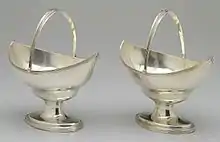Ann-Olympe Bateman (née Dowling;[1] 1748–1813) was an English silversmith. She married into a distinguished family of London silversmiths. She made work in the Neoclassical style in partnership with her brother-in-law, Peter Bateman.[2] Peter and Ann's husband, Jonathan, joined the business established by their parents, Hester and Jonathan Bateman. Ann's first mark was registered in 1791, the year her husband died and left all his property to his wife . A third generation of Batemans, Ann's son, William, joined the partnership in 1800. Thus, there are silver objects that bear one, two, and even three Bateman marks. All of the Batemans who worked in the family business are listed in the official registers of London's Goldsmiths' Hall.[3]

Three sugar baskets, designed for sugar or sweetmeats,[4] by Ann and Peter Bateman in the collection of the Minneapolis Institute of Art attest to the fashion for lavish displays at the table (sugar being newly available from the Caribbean colonies). Their work is characterized by fine engraving and delicate beaded edges.
References
- ↑ Campbell, Gordon (2006). The Grove Encyclopedia of Decorative Arts, Volume 1. Oxford University Press. p. 79. ISBN 0-19-518948-5.
- ↑ Bly, John (2000). Discovering Hallmarks on English Silver (9th ed.). Princes Risborough: Shire. p. 24. ISBN 0-7478-0450-8.
- ↑ Grimwade, Arthur (1976). London Goldsmiths 1697-1837: Their Marks and Lives from the Original Registers at Goldsmiths' Hall and Other Sources. London: Faber and Faber. ISBN 0-571-15238-4.
- ↑ "Sugar baskets: Gallery Label - Current". ArtsConnectEd. 10 May 2006. Archived from the original on 4 March 2016. Retrieved 30 October 2015.